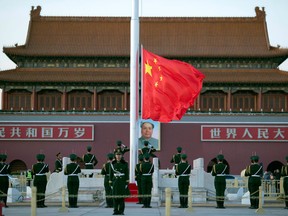Lawrence Solomon: Pussyfooting with China (original) (raw)
More
- Innovation
* Information Technology - FP500
- Podcasts
- Small Business
- Shopping Essentials
* Home Living
* Style & Beauty
* Kitchen & Dining
* Personal Care
* Entertainment & Hobbies
* Gift Guide
* Travel Guide
* Outdoor Living - Obituaries
* Place a Notice - Classifieds
* Place a Classifieds ad
* Working - Advertise With Us
- Innovation
This advertisement has not loaded yet, but your article continues below.
Lawrence Solomon: Pussyfooting with China
The largest dictatorship in the world, China with its 1.4 billion people, is today engaged in the most extensive crackdown on civil liberties since the Tiananmen massacre
Published May 21, 2015 • 4 minute read
You can save this article by registering for free here. Or sign-in if you have an account.

AP Photo/Ng Han Guan
Western NGOs that operate in China stay silent to remain in the Chinese Communist Party’s good books
The largest dictatorship in the world, China with its 1.4 billion people, is today engaged in the most extensive crackdown on civil liberties since the Tiananmen massacre: NGOs have been shut down, thousands of citizens have been picked up by the police, the fates of many are unknown, none are expected to get a fair trial for “crimes” that include publishing books and studies, none are even expected to get a fair hearing for their plight in the state-controlled press.
This advertisement has not loaded yet, but your article continues below.
THIS CONTENT IS RESERVED FOR SUBSCRIBERS ONLY
Subscribe now to read the latest news in your city and across Canada.
- Exclusive articles from Barbara Shecter, Joe O'Connor, Gabriel Friedman, and others.
- Daily content from Financial Times, the world's leading global business publication.
- Unlimited online access to read articles from Financial Post, National Post and 15 news sites across Canada with one account.
- National Post ePaper, an electronic replica of the print edition to view on any device, share and comment on.
- Daily puzzles, including the New York Times Crossword.
SUBSCRIBE TO UNLOCK MORE ARTICLES
Subscribe now to read the latest news in your city and across Canada.
- Exclusive articles from Barbara Shecter, Joe O'Connor, Gabriel Friedman and others.
- Daily content from Financial Times, the world's leading global business publication.
- Unlimited online access to read articles from Financial Post, National Post and 15 news sites across Canada with one account.
- National Post ePaper, an electronic replica of the print edition to view on any device, share and comment on.
- Daily puzzles, including the New York Times Crossword.
REGISTER / SIGN IN TO UNLOCK MORE ARTICLES
Create an account or sign in to continue with your reading experience.
- Access articles from across Canada with one account.
- Share your thoughts and join the conversation in the comments.
- Enjoy additional articles per month.
- Get email updates from your favourite authors.
THIS ARTICLE IS FREE TO READ REGISTER TO UNLOCK.
Create an account or sign in to continue with your reading experience.
- Access articles from across Canada with one account
- Share your thoughts and join the conversation in the comments
- Enjoy additional articles per month
- Get email updates from your favourite authors
Sign In or Create an Account
At the same time, the largest democracy in the world, India with its 1.3 billion people, today enjoys a vibrant free press, a highly respected judiciary and a government newly elected on a promise to grow the economy through free market principles. Yet in a major study released this week by PEN International, PEN Canada and the University of Toronto Faculty of Law’s International Human Rights Program, the Indian government is condemned for stifling freedom of expression.
What would motivate PEN and U of T to attack the democracy and not the dictatorship? In part, perhaps, a distaste for India’s polarizing new prime minister, Narendra Modi, who won a landslide victory in national elections last year. In advance of Modi’s trip to Canada last month, Renu Mandhane, the Executive Director of U of T’s International Human Rights Program, and Tasleem Thawar, the Executive Director of PEN Canada, wrote Prime Minister Stephen Harper a letter on University of Toronto letterhead captioned “India’s dismal record on freedom of expression poses risk to Canada.”
-
 Chinese billionaire a no-show after his solar company loses US$19B in market value in just 24 minutes
Chinese billionaire a no-show after his solar company loses US$19B in market value in just 24 minutes -
 China claims airspace and seas around artificial islands in disputed waters after warning off U.S. plane
China claims airspace and seas around artificial islands in disputed waters after warning off U.S. plane
Get the latest headlines, breaking news and columns.
By signing up you consent to receive the above newsletter from Postmedia Network Inc.
A welcome email is on its way. If you don't see it, please check your junk folder.
The next issue of Top Stories will soon be in your inbox.
We encountered an issue signing you up. Please try again
This advertisement has not loaded yet, but your article continues below.
Their letter, which announced they were releasing a report to mark Modi’s first year in office, urged Harper to “put freedom of expression on the agenda for this week’s talks with Indian Prime Minister Narendra Modi.” Nowhere did Mandhane and Thawar make even a feeble case of any risk to Canada. Rather, the injustices they pointed to — for example, an Indian Supreme Court decision that upheld parts of a law making internet service providers responsible for libelous material they might carry — hardly warranted a dressing down of Modi by Harper. Such controversies, normal in a democracy, don’t rise to the level of what most Canadians would consider human rights abuses. Moreover, it is certainly not Harper’s business to second-guess a reasoned decision by the Supreme Court of India, let alone the laws enacted by India’s democratically elected legislature, in the process embarrassing a visiting head of government.
This week PEN and U of T were again untoward, saying in a press release, “Earlier this year, India’s Ministry of Home Affairs used an extensive arsenal of vague and overbroad laws to muzzle the world’s largest environmental watchdog, Greenpeace International” through “seemingly innocuous provisions in the Indian Foreign Contribution (Regulation) Act.”
This advertisement has not loaded yet, but your article continues below.
Those “seemingly innocuous provisions” prohibit foreign funding of political activities by charities. As PEN and University of Toronto Faculty of Law must know, Canada also prohibits charities from receiving foreign funds to engage in non-charitable activities, and severely limits any political activity by a charity. In fact, Canada long ago revoked Greenpeace Canada’s charitable status for engaging in political activity. Why the outrage over a democratic India appearing to follow in the footsteps of a democratic Canada? If Greenpeace India wants to remain a charity, it need only operate without foreign funding, some $2 million a year or 40 per cent of its budget, which it receives largely to influence decisions affecting climate change. That and an end to other non-charitable activities, which the Indian government alleges includes funding the political campaign of a former Greenpeace consultant.
India is a convenient target for social justice activists around the world because it is led by a reincarnation of Ronald Reagan, because it is on the wrong side of the climate change debate, and because it’s easy to attack India. Being a democracy, its government sees peaceful dissent, debate and demonstrations as the very stuff of daily life, and thus no existential threat. The study from PEN and U of T, entitled “Imposing Silence: The Use of India’s Laws to Suppress Free Speech,” would be unlikely to draw any retaliation.
Not so with China’s Communist Party, whose thin-skinned leadership fears for its very existence, and bullies those who question its human rights record. The threat of sanctions by China, particularly once China became an economic powerhouse, has chilled many organizations and countries, too, as seen in their reluctance to publicly welcome the Dalai Lama. The many thousands of Western NGOs that operate in China well understand this, and stay silent to remain in the Chinese Communist Party’s good books. This is the real face of “Imposing Silence.”
Notice for the Postmedia Network
This website uses cookies to personalize your content (including ads), and allows us to analyze our traffic. Read more about cookies here. By continuing to use our site, you agree to our Terms of Use and Privacy Policy.





